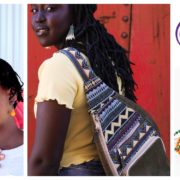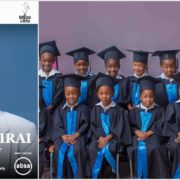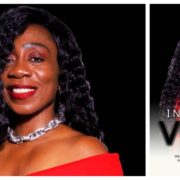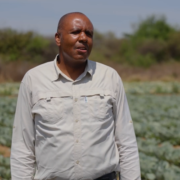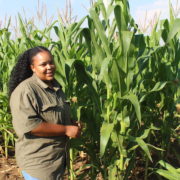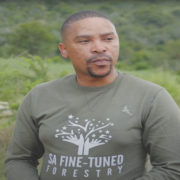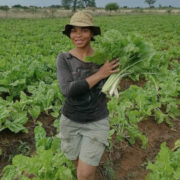Lioness Weekender spoke to the inspirational Rudo Kumirai about her passion for changing the education landscape for Zimbabwe’s children and creating the opportunity to access high quality, affordable education
What does your company do?
Helena Holdings (Private) Limited, an educational group that operates a preschool under the name KIDS-R-US Preschool, and a primary school under the name Helena Primary School. The School group is jointly known as Helena Schools. The school’s value-for-money pricing model is designed to offer a solution to clients aspiring to send their children to top educational institutions, offering high quality infrastructure, and a globally competitive curriculum, offered at the lowest school fees range in our bracket. Today, the company employs 24 people.
What inspired you to start your company?
I founded the group in 2010 at age 29 years upon my return from Zambia, where I had been serving as the Managing Director of a micro-finance company. In my years advising many other corporate clients on their businesses, I’d come to understand that a good enterprise will thrive if it’s in an area of the promoter’s passion. I always loved children, and so I figured the lawyer-cum–banker would make a great Edupreneur. My younger self was daring, bold and fearless, so the fact that I had no experience in enterprise myself, nor specific training in education didn’t deter me in spite of receiving little support from my community. And being the dreamer I was, it was easy to imagine this top-class educational facility that would offer the kind of curriculum that was a combination of the things I’d been exposed to over time. In 2019, it’s no longer “the surprising business choice”, it’s one of our country’s most successful SME business sectors, with over 2000 new schools having been registered over the past 10 years. But back then, in May 2010 when we first opened our doors, Helena Schools was something of a novice and has since then been a trend-setter for other schools in our community – something I’m quite proud of.
Why should anyone use your service or product?
Since our inception, Helena Schools was renowned for the beauty of its facilities. We were one of the first schools to establish ourselves in a renovated residential property, and I wanted our look and feel to stand out. But I am most proud of the curriculum at the school, which we call the Helena Leadership Curriculum. Our school has developed a first ever Leadership Development Curriculum for primary school. The concept of leadership development isn’t new. However, the belief that the skills can be taught at such a young infant age, whilst their world views are still being shaped, their characters still developing is still new with the primary school sector. But I believed in catching them young. We, like Ministry of Education observed that our academic-focused Zimsec Curriculum was inadequate to prepare a student for success in their future.
In 2016, we embarked on research into the following areas:
-
Why did it seem as though children from more affluent backgrounds succeeded better in life than children from more disadvantaged backgrounds, even though such children may have better academic performance?
-
On a global scale, why do western countries seem to produce far more investors and scientists than Africa?
-
Did God discriminate when he gave talent to his children on grounds of race, ethnicity, county of origin, or social status?
These questions led us to conclude that there is something about the environments of western, more affluent students that we can incorporate in our schools to produce more successful students. Our Zimbabwean curriculum was producing students with high work ethic and able to master and memorize subject matter. The working world however required adults who can think, problem solve, add value, with powerful communication skills to convey these ideas.
It is with this background that our school developed the Helena LDC, which is a skills-based, character- building curriculum, aimed at better equipping our students for success. Under the Helena LCD, we have the following subjects:
-
To develop intrinsic leadership skills: – Oral Communication Skills; – Creativity and Innovation; – Critical Thinking Skills; – Problem Solving and Analytical Skills.
-
To develop the extrinsic corporate leadership skills required in the working world: – Business and Entrepreneurship; – Ethics and Values; – Invention-Based Science.
-
Our last pillar is the Community-Builder Leader, which seeks to develop students who won’t just define their success by the money they make, the profession they choose and the quality of their family life. Instead, success is defined by the impact of the contribution they will add in making the world a better place.
Under this broad pillar the children are introduced to the Sustainable Development Goals and learn about issues like climate change, pollution, poverty reduction amongst others. Each of these themes will run for a year. Last year, they learnt about climate change, they visited rubbish dumps, a recycling plant, had a talk from EMA and later planted trees in their community. In true Helena fashion, where, once equipped, “We let them lead young”, they led the school in a clean-up campaign with their parents, did a school play on environment and the ways they, as children can help save their planet, and took their play on road shows to three schools in their community. The LDC is done in combination with the new Zimsec Curriculum. It is this curriculum that has since won the following awards as an innovative approach to education: 1. Ashoka Change Maker School nomination; 2. Young Africa Leadership Initiative (YALI) Business Idea winner.
Tell us a little about your team
Of our staff compliment of 21, 13 of our staff are female. Our school headmistress and T.I.C are both female. Our board of directors has a 50:50 gender representation. Having said the above, I think our industry has always been well represented by female teachers. So, our emphasis is gender mainstreaming has been more on equipping our team with the higher qualification (we have paid for a number of our female teachers to improve their qualifications from diplomas to undergraduate degrees, and one teacher a master’s degree). We have also sent the team on a number of skills development workshops for leadership roles in a school, and within our industry.
Share a little about your entrepreneurial journey. And do you come from an entrepreneurial background?
The preschool business “or crèche” as it is sometimes described, is often times regarded as a simple business, for simple woman, who ‘spend their day playing with children. I am a lawyer by profession, and a banker by training with over 11 years’ experience in banking and financial services and have worked in various senior management positions in Southern Africa, having served as the Managing Director of a Micro-bank in Zambia, and a Corporate and Legal Advisor for the Botswana IFSC. My work experience has largely shaped the way I’ve run our schools over the years, aiming to establish a professional enterprise that would be highly profitable on the one hand, and socially and economically impactful on the other. So, my choice in enterprise in schools, has encouraged women, and men alike, to pursue their areas of passion boldly, and turn them into respectable, impactful enterprises, regardless how the world may perceive them. One of the defining characteristics of my leadership style is that I refuse to allow myself, our team, and our students to be limited by how things have been in the past. When developing our own curriculum, our stakeholders struggled to believe our team of teachers and staff could come up with a teaching approach and content that could match, and maybe even exceed what was available in our country, let alone in other parts of the world. Our school motto is “If we can think it, we can do it”, and this mantra has helped our children and staff believe that we all have something to give to impact the world. God doesn’t give talent based on race, ethnicity or class, and so our small team of staff and children is leading the way with our leadership curriculum, the first of its kind designed for a primary school. Our curriculum is not intended just for the benefit of our school, or country, but for impact at the global scale.
What are your future plans and aspirations for your company?
The medium-term expansion plan for the group is to establish a new international online school to enrol students in Zimbabwe, and the broader African Continent; and the expansion of the physical school through the purchase of a stand and construction of new classroom blocks EXPANSION OF PHYSICAL SCHOOLS: We have already started work to scale up our school’s impact. We are actively on the market looking for the right school land for the construction of a fully-fledged primary school. A boarding school, with creative, yet cost effective technology driven designs will be used to widen our catchment market to be country wide. Upon completion of this stage, our school will be the first leadership development primary school in the country, uniquely achieving a mixed enrollment of affluent students on a different fee structure to less-affording students.
We will then move on to regionalize our school, by leveraging on our accreditation as an Ashoka Change Maker School (We will join a network of international schools from all over the world) and our association with the Young African Leadership Initiative (YALI) Alumni to open our doors to students from the SADC region. Zimbabwe’s education system is well respected in the region, so coupled with our leadership curriculum; we will ideally attract African boarding students, thereby becoming the first leadership development primary school in the region. Our school models itself after the African Leadership Academy (ALA) which is a Leadership development school for High school students from the continent, and Asheshi University, a Leadership development tertiary school in Accra, Ghana, which is also open to African students.
Creation of Helena Online School
The onset of the pandemic brought about a dramatic change in the education space. Schools were forced to change from traditional teaching in physical spaces, to online learning. Whilst the change came at a time we were unprepared, the group quickly saw the opportunity to achieve its scale-and-reach aspirations, by taking advantage of boundless digital space. To this end, Helena Schools is currently setting up an international online school for the benefit of both the formal and home school learners across Africa. Modelled after some of the leading international and African leadership institutions, the Online School will provide a range of academic curriculums, our globally competitive and relevant leadership development curriculum based on the 21st Century skills and interactive learning platform with both offline and online accessibility.
What gives you the most satisfaction being an entrepreneur?
Our school is not amongst the biggest schools in the country, but I believe we are amongst the most impactful. We are taking children from middle-to-lower income backgrounds and equipping them to compete amongst the best of their kind on a world stage. Our unique pricing model has found a way to create access to our education to families previously excluded, whilst still delivering the highest standards that exceed the price. Our scholarship model has also allowed for a blended enrolment, mixing children of different backgrounds in one school. Our business model is one of our greatest achievements. I am unconventional in my thinking, a style that is difficult to comprehend within the education sector which is built on the principles of systems and uniformity. However, I truly believe that the work we have begun through our leadership curriculum is key to shaping our country’s future leaders.
What’s the biggest piece of advice you can give to other women looking to start-up?
I would want to encourage any woman, young and old thinking of starting their business venture – START. Experts call this your minimum viable product. Start with the smallest and most practical version of your dream. The version thats enough for you to start even tomorrow. You will never have all your “ducks in a row”, or all the resources you need to start in the beginning. The process is a continuous journey of overcoming hurdles, one hurdle at a time. You actually will never know what you are made of, or whether you are cut out for enterprise by analysing on the side lines. You have to get in, get your hands dirty and just start. Though a challenging journey, that will often leave you in tears when you reach a road block, it can be one of the most fulfilling things you can do with your life, if only you would START.
To find out more about Helena Schools, send an email to: rmakarawo@gmail.com or visit the company website and social media platforms:
WEBSITE | YOUTUBE


